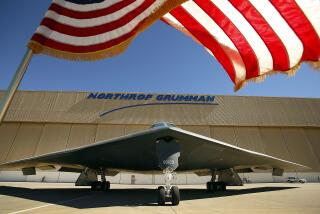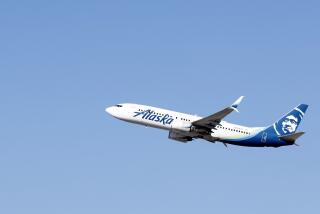AF Secretary Says He Has Confidence in Northrop’s Chief
Air Force Secretary Donald B. Rice expressed strong confidence Thursday in Northrop Corp.’s top management, attempting to soften the impression created by a recent review of the aerospace firm that found serious problems in six major areas of its business.
Rice testified before the Senate Armed Services Committee, which has continued to support the controversial $62.8-billion B-2 Stealth bomber program in a political battle against efforts in the House of Representatives to kill it. Northrop is the prime contractor on the project.
Asked if he has the “ultimate in confidence” in the top management of Northrop, Rice said he personally knows Northrop Chairman Kent Kresa and the president of Northrop’s B-2 division, Oliver Boileau. “I think we have every reason to have the confidence that you speak of,” Rice said.
Rice offered a sharply different slant on the Air Force review than that given by Brig. Gen. Robert W. Drewes, the Air Force deputy chief of staff for contracting who performed the review, in testimony Tuesday before a House committee. Rice said Thursday that it would be “inappropriate and unwise” to consider the review in determining the B-2’s future.
Drewes’ statements and the review itself have been seized on by congressional opponents of the B-2 as a rationale for killing the program. So far, the House Armed Services and Appropriations committees have voted to kill it.
Separately, the Air Force issued a statement Thursday, taking exception to an article in Thursday’s Times that reported that the B-2 is continuing to fall behind schedule and that the second B-2 is nine months behind schedule for its first flight.
The Senate Armed Services Committee hearing was hastily called and came just hours before a key vote in the Senate Appropriations Committee on an amendment to kill B-2 production funding in 1991. The amendment, sponsored by Sen. Patrick J. Leahy (D-Vt.), was defeated by a vote of 15 to 14.
An aide to Leahy said the Air Force review of Northrop has become ammunition in the battle to gain votes against the B-2. In August, the B-2 survived when the Senate voted 56 to 43 to continue the program.
Rice testified that it would cost the government $8 billion to phase out the program. So far, $27 billion has been appropriated for the program and $24 billion has been spent, the Air Force secretary testified.
Asked by committee Chairman Sam Nunn (D-Ga.) what the taxpayers have received for the $24 billion investment in the B-2, Rice said Stealth technology developed in the program has “permeated” the U.S. aircraft industry and made possible such programs as the Navy A-12 attack jet and the Air Force advanced tactical fighter.
“If the B-2 fails, we will see the atrophy of the air-breathing leg of the triad and that would be a great tragedy,” Rice said. The triad to which he referred is the U.S. strategic offensive force composed of ground-based missiles, submarine-based missiles and the bomber force.
Nunn has been the center of Senate support for the B-2, and a series of questions he asked Thursday seemed designed to show that a cancellation of the program would be unwise. In a later interview, Nunn said Northrop’s problems are not unique in the defense industry.
“The Air Force had concerns about Northrop, and they are working with them to improve management,” Nunn said after the hearing. “That’s what you want them to do. If you cut out every defense . . . contractor that had some management problems, you would basically shut down defense production lines.”
In objecting to The Times’ story, the Air Force said the second B-2 built by Northrop was originally scheduled to fly last spring and that it was delayed by five months as a result of a funding change and a strike at Boeing, a subcontractor. The schedule was adjusted to account for those delays and now the program is just one month behind schedule, because of a fuel leak, the Air Force said.
However, in an interview Tuesday, Assistant Secretary of the Air Force John J. Welch Jr., the service’s chief acquisition executive, said he “guessed” that the second B-2 was originally scheduled to fly six months after the No. 1 bomber first took to the air in July, 1989. On that basis, the first flight would have occurred in January, nine months ago.
The Air Force did not object to the statement in the article that the B-2 test program is falling further behind schedule.
Nunn said he is not concerned that the B-2 flight test program is going slowly. “It is important for them to get the tests right,” Nunn said. “If the Air Force slows down the tests for good reasons, I don’t have any problem with that. The important thing is that the test be done correctly and accurately so that we can rely on the data that comes out of it.”







